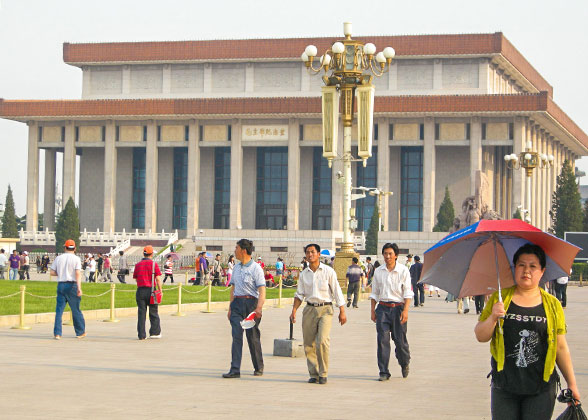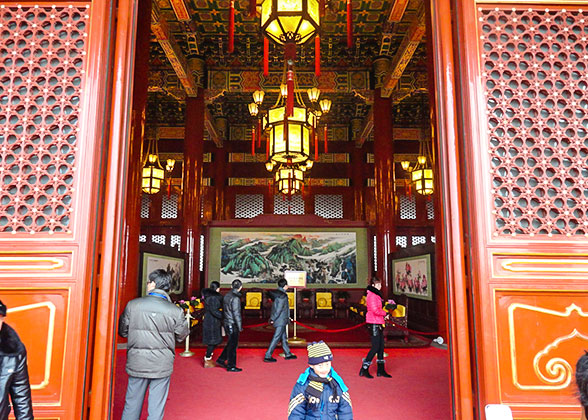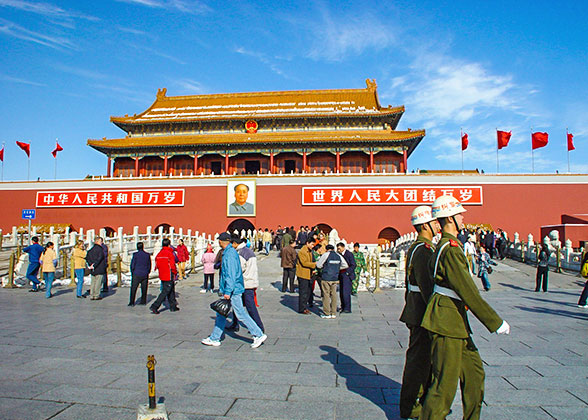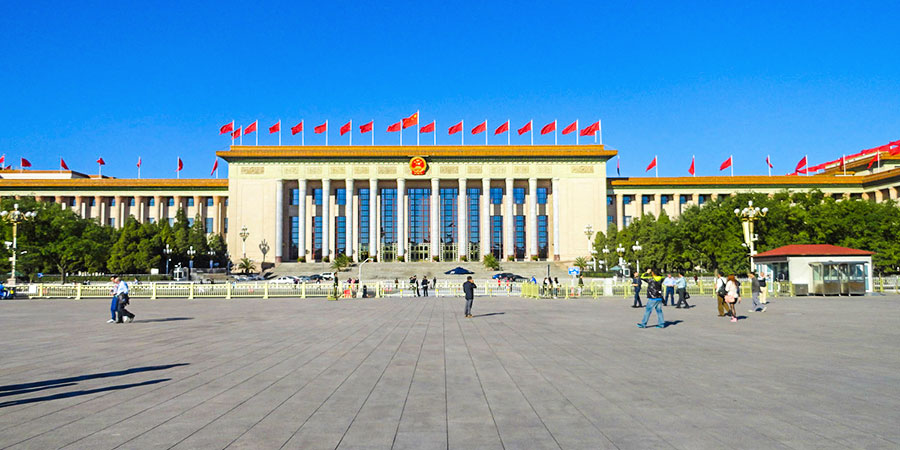Tiananmen Square FAQ
As the world largest central square, Tiananmen Square presents its distinctive characteristics by its surrounding scenic spots. Visitors coming to Beijing usually will not miss these attractions, such as the Tiananmen Tower, Memorial Hall of the Chairman Mao, Monument to the People’s Heroes and National Museum as well as the well-known National Flag Raising Ceremony. ![]() Where is the Tiananmen Square located?
Where is the Tiananmen Square located?![]() It is located in the center of Beijing City. As a representative and symbolic location of Beijing, it is a place not to be missed on any Beijing trip.
It is located in the center of Beijing City. As a representative and symbolic location of Beijing, it is a place not to be missed on any Beijing trip.
![]() When was the Square constructed and how large is it?
When was the Square constructed and how large is it?![]() Construction began in 1417, during the reign of Emperor Chengzu of the Ming Dynasty (1368 - 1644), at the same time as the construction of Beijing City and the Forbidden City began. After 1949, the Square’s size was enlarged. Now, it covers an area of 440,000 square meters (about 526,235.6 square yard), extending 880 meters (about 2,887 feet) in north-to-south and 500 meters (about 1,640 feet) east-to-west. It’s said that the large Square can hold 1 million people in total.
Construction began in 1417, during the reign of Emperor Chengzu of the Ming Dynasty (1368 - 1644), at the same time as the construction of Beijing City and the Forbidden City began. After 1949, the Square’s size was enlarged. Now, it covers an area of 440,000 square meters (about 526,235.6 square yard), extending 880 meters (about 2,887 feet) in north-to-south and 500 meters (about 1,640 feet) east-to-west. It’s said that the large Square can hold 1 million people in total.
|
|
![]() Is it true that the National Flag Raising Ceremony happens at sunrise every day?
Is it true that the National Flag Raising Ceremony happens at sunrise every day?![]() It is true. In order to better stress the importance of the National Flag Raising Ceremony, a professional national flag raising group has been formed. According to the astronomical knowledge, the sun takes two minutes and seven seconds to fully rise above the horizon. As a result, the national flag rises from the ground to the top of the flagpole in exactly two minutes and seven seconds.
It is true. In order to better stress the importance of the National Flag Raising Ceremony, a professional national flag raising group has been formed. According to the astronomical knowledge, the sun takes two minutes and seven seconds to fully rise above the horizon. As a result, the national flag rises from the ground to the top of the flagpole in exactly two minutes and seven seconds.
2024 Timetable for Flag-Raising Ceremony
 |
| Chairman Mao's Memorial Hall |
![]() I heard that to visit the Memorial Hall of Chairman Mao requires a lot of queuing. Is it true? What is your suggestion on the time to line up?
I heard that to visit the Memorial Hall of Chairman Mao requires a lot of queuing. Is it true? What is your suggestion on the time to line up?![]() Yes, it is true. As the opening time of the Memorial Hall of Chairman Mao is limited and as it is an important location in Beijing, every day a large number of tourists go to have a chance to see Chairman Mao’s embalmed body, especially during holidays. Sometimes, people queue an hour or two, or longer. Therefore, I suggest you go to the Square in the early morning to enjoy the National Flag Raising first. After that, you can go to line up, in which manner you can save some time for your later trip plan.
Yes, it is true. As the opening time of the Memorial Hall of Chairman Mao is limited and as it is an important location in Beijing, every day a large number of tourists go to have a chance to see Chairman Mao’s embalmed body, especially during holidays. Sometimes, people queue an hour or two, or longer. Therefore, I suggest you go to the Square in the early morning to enjoy the National Flag Raising first. After that, you can go to line up, in which manner you can save some time for your later trip plan.
![]() Why do the travelers have to abide by strict rules when visiting the Memorial Hall of Chairman Mao? What are the rules?
Why do the travelers have to abide by strict rules when visiting the Memorial Hall of Chairman Mao? What are the rules?![]() Firstly, Chinese people respect Chairman Mao very much due to his great contributions to China. As a result, they take it for granted that Chairman Mao’s body should be well respected. Secondly, anything taken into the hall might have the potential to do harm to the decorations of the hall or the body of Chairman Mao. For these two major reasons, very strict rules are carried out. The following rules need to be taken seriously: everyone needs to wear neat, delicate clothes and to take off hat to pay respect; vests and slippers are not allowed; handbags, backpacks, cameras, video devices, cups and drinks are not allowed to be taken in; do not chase about or make noises.
Firstly, Chinese people respect Chairman Mao very much due to his great contributions to China. As a result, they take it for granted that Chairman Mao’s body should be well respected. Secondly, anything taken into the hall might have the potential to do harm to the decorations of the hall or the body of Chairman Mao. For these two major reasons, very strict rules are carried out. The following rules need to be taken seriously: everyone needs to wear neat, delicate clothes and to take off hat to pay respect; vests and slippers are not allowed; handbags, backpacks, cameras, video devices, cups and drinks are not allowed to be taken in; do not chase about or make noises.
![]() Is it the real body of Chairman Mao that is laid at the Memorial Hall?
Is it the real body of Chairman Mao that is laid at the Memorial Hall?![]() Definitely yes, it is the body of Chairman Mao. According to an advanced technology, his body is still well-preserved in a crystal coffin. That’s why a great many people would like to pay respect to him in the Memorial Hall, even for just a few minutes.
Definitely yes, it is the body of Chairman Mao. According to an advanced technology, his body is still well-preserved in a crystal coffin. That’s why a great many people would like to pay respect to him in the Memorial Hall, even for just a few minutes.
 |
| On the Tower |
![]() Why were five archways constructed as the entrance of the Tiananmen Tower?
Why were five archways constructed as the entrance of the Tiananmen Tower?![]() The five archways were constructed by a very strict hierarchy in ancient time. The middle archway was particularly designed for the emperors’ entering and exit. Therefore, when the ancient emperors went out to pray at the Temple of Heaven or they saw off the generals for battles, the middle archway was the emperors’ exclusive door. In some special cases, for example, when the parents of the emperors went into the palace or the empress married the emperor, they could enter through the archway. The other four archways were constructed for the court ministers, emperors’ concubines and other people to enter and exit. There was a restriction and taboo for the middle archway: only happy things could be allowed through. Therefore, although the emperor died, his body was forbidden pass through the archway.
The five archways were constructed by a very strict hierarchy in ancient time. The middle archway was particularly designed for the emperors’ entering and exit. Therefore, when the ancient emperors went out to pray at the Temple of Heaven or they saw off the generals for battles, the middle archway was the emperors’ exclusive door. In some special cases, for example, when the parents of the emperors went into the palace or the empress married the emperor, they could enter through the archway. The other four archways were constructed for the court ministers, emperors’ concubines and other people to enter and exit. There was a restriction and taboo for the middle archway: only happy things could be allowed through. Therefore, although the emperor died, his body was forbidden pass through the archway.
![]() What is the relationship between the Tiananmen Square and the Forbidden City?
What is the relationship between the Tiananmen Square and the Forbidden City?![]() The Chinese ancient capital city includes outer city, inner city, imperial city and palace city. Among them, the Forbidden City is the palace city, taking the Meridian Gate as the main gate. Outside the palace city, it is imperial city, having fours gates – Heaven Peace Gate (Tiananmen Tower), Earth Peace Gate, East Peace Gate and West Peace Gate. Tiananmen Square happens to be the outer space of the Heavenly Peace Gate.
The Chinese ancient capital city includes outer city, inner city, imperial city and palace city. Among them, the Forbidden City is the palace city, taking the Meridian Gate as the main gate. Outside the palace city, it is imperial city, having fours gates – Heaven Peace Gate (Tiananmen Tower), Earth Peace Gate, East Peace Gate and West Peace Gate. Tiananmen Square happens to be the outer space of the Heavenly Peace Gate.

